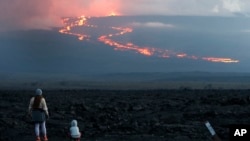Scientists say they were able to identify signs that Hawaii’s Mauna Loa volcano might erupt about two months before it exploded.
A new study explains the signs they discovered and how their method might be used to predict future eruptions.
Mauna Loa is the world’s largest active volcano. The volcano’s most recent eruption began in November 2022. In the weeks before the eruption, scientists identified, or detected, small earthquakes nearby. They also recognized other signs of volcanic activity and were able to warn people on the island of Hawaii.
Now, examinations of lava from the volcano have confirmed when melted rock underground started to move.
Kendra Lynn is a research geologist at the Hawaiian Volcano Observatory who helped lead the research. She also co-wrote the study, which recently appeared in the publication Nature Communications.
Lynn told the Associated Press that ground expansion and increased earthquake activity near the volcano resulted from melted magma rising from lower levels of Earth’s crust. This movement of liquefied rock filled openings beneath the volcano.
When the underground pressure got high enough, the magma broke through hard surface rock and became lava. Later, the researchers collected pieces of the volcanic rock.
The team studied the chemistry of certain crystals within the lava to estimate when major movements began. It found that around 70 days before Mauna Loa’s eruption, large amounts of melted rock had moved from three to five kilometers underground to just two kilometers beneath the surface. The researchers said this movement matched the timeline the geologists had observed with other signs.
Before 2022, the last time Mauna Loa erupted was in 1984. Most of the U.S. volcanoes scientists consider to be active are found in Hawaii, Alaska and near the West Coast. Worldwide, about 585 volcanoes are considered active.
“Volcanoes are tricky because we don’t get to watch directly what’s happening inside – we have to look for other signs," said Erik Klemetti Gonzalez. He is a volcano expert at Denison University in Ohio who was not involved in the study.
Ben Andrews heads a volcano program for the U. S. government’s Smithsonian Institution. He also was not involved in the study. Andrews told the AP that scientists are still not able to fully predict volcanic eruptions. But he said they can issue a “forecast” based on observations and data.
Andrews compared volcano forecasts to weather forecasts, which are based on the probability that an event might happen. Experts say better data about past volcanic behavior can help researchers produce more detailed forecasts of future activity.
Klemetti Gonzalez added, “We can look for similar patterns in the future and expect that there’s a higher probability of conditions for an eruption happening.”
I’m Bryan Lynn.
The Associated Press reported this story. Bryan Lynn adapted the report for VOA Learning English.
_____________________________________________
Words in This Story
erupt –v. to have a sudden and violent explosion
magma –n. melted rock underneath the Earth’s surface
crust – n. a hard, dry layer of the surface of something
crystal – n. a kind of see-through rock
tricky – adj. difficult to deal with or do
forecast – n. a report saying what is likely to happen in the future
pattern – n. a particular way that something is often done or repeated






Forum